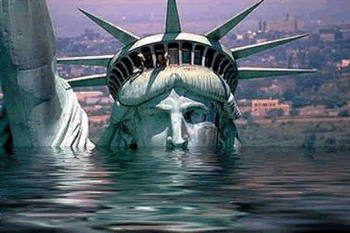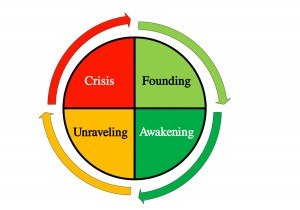Decide for yourself, but the man who wrote Steve Bannon’s ‘Bible’ sounds barmy
 There is nothing to indicate that Neil Howe suffers from delusional tendencies. His biographical sketch is very clear: he is an American author and an amateur historian, a second career that he began after years of working as a public policy consultant on global aging, long-term fiscal policy, and migration. He is also one of the two people responsible for creating the term “millennial generation” to describe those who reach young adulthood in the early 21st century.
There is nothing to indicate that Neil Howe suffers from delusional tendencies. His biographical sketch is very clear: he is an American author and an amateur historian, a second career that he began after years of working as a public policy consultant on global aging, long-term fiscal policy, and migration. He is also one of the two people responsible for creating the term “millennial generation” to describe those who reach young adulthood in the early 21st century.
But Mr Howe is now, perhaps unfairly, famous for something a lot darker. He is said to have inspired a delusional campaign. And it’s because, as he affirms in his sober piece in The Washington Post, Mr Howe is the co-author of the book that inspires Donald Trump’s chief strategist Steve Bannon. The book is titled ‘The Fourth Turning’.
Mr Howe claims it is being portrayed in an “absurdly apocalyptic” way.
And yet, his Washington Post piece suggests it probably is pretty apocalyptic. Absurdly so.
How? Well, the book is, as Mr Howe describes, a theory of generational change. America (and other modern societies) have recurring four-generation-long eras. And we are now in the fourth turning. That, in sum, is the essence of the book. That is the sanitised version.
But now consider the import of ‘The Fourth Turning’ in Mr Howe’s own words.
 ** “The cycle begins with the First Turning, a ‘High’, which comes after a crisis era. In a High, institutions are strong and individualism is weak. Society is confident about where it wants to go collectively, even if many feel stifled by the prevailing conformity.”
** “The cycle begins with the First Turning, a ‘High’, which comes after a crisis era. In a High, institutions are strong and individualism is weak. Society is confident about where it wants to go collectively, even if many feel stifled by the prevailing conformity.”
** “The Second Turning is an ‘Awakening,’ when institutions are attacked in the name of higher principles and deeper values. Just when society is hitting its high tide of public progress, people suddenly tire of all the social discipline and want to recapture a sense of personal authenticity.”
** “The Third Turning is an ‘Unraveling’, in many ways the opposite of the High. Institutions are weak and distrusted, while individualism is strong and flourishing. Third Turning decades such as the 1990s, the 1920s and the 1850s are notorious for their cynicism, bad manners and weak civic authority. Government typically shrinks, and speculative manias, when they occur, are delirious.”
** “Finally, the Fourth Turning is a ‘Crisis’ period. This is when our institutional life is reconstructed from the ground up, always in response to a perceived threat to the nation’s very survival. If history does not produce such an urgent threat, Fourth Turning leaders will invariably find one — and may even fabricate one — to mobilize collective action.”
I’ll tell you what I find disturbing in Mr Howe’s words:
“…speculative manias, when they occur, are delirious…”
“Fourth Turning leaders …may even fabricate (an urgent threat)…”
And his declaration, later in the WaPo piece, that Fourth Turning crises “refresh and redefine our national identity… Forests need periodic fires; rivers need periodic floods. Societies, too. That’s the price we must pay for a new golden age.”
Cyclic change is hardly a new idea. But as consciousness evolves, one would hope it doesn’t have to get to the lowest point of a crisis – ie a fire, a flood, a Holocaust – for social renewal.
That’s the point of progress.

